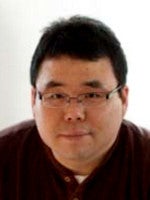Polymorphism is the phenomena of solid compounds forming different crystal structures. Polymorphism is important in a myriad of practical applications of solid compounds such as pharmaceutical solids. However, the origin of the polymorphic behavior of solid compounds is still not well understood. We investigated the fluid-to-solid and solid-to-solid phase transitions of close-packed structures of strongly-segregated polymeric block copolymer micelles, model colloidal spheres. In the fluid-to-solid transitions, we observed if the crystal domains of close-packed micelles are formed small by deep temperature quenching, the block copolymer micelles form metastable hexagonal-close packed (HCP) and random stacking of two-dimensional close-packed layers (RHCP) structures instead of the stable face-centered cubic (FCC). However, as the crystal domains of non-cubic structures grow, these metastable close-packed structures transform to the stable FCC. In the solid-to-solid transition case, we observed that the martensitic shear transformation is employed for the transition from the initial kinetically-arrested FCC structures to stable HCP, but the martensitic transition could be initiated only when the crystal domains become sufficiently small. Furthermore, the martensitic transformation appears to utilize a specific transformation pathway due to the morphology of the crystal domains. These observations suggest that the polymorphic behavior of solids is strongly regulated by the size and morphology of crystal domains, and perhaps, reveals a physical origin of the Ostwald rule of stages in the phase transitions in a quantitative and thermodynamically well-defined way.

The current research focus of Sangwoo Lee is the thermodynamics and phase transition behaviors of polymeric materials and related material systems to understand their structure and property relationships. Sangwoo Lee received his B.S. degree from the Seoul National University in South Korea in 2002 and Ph.D. in chemical engineering from the University of Minnesota in 2011. He received his postdoctoral training at the University of Minnesota in 2011 – 2013 before his independent career as an assistant professor at the department of chemical and biological engineering in the Rensselaer Polytechnic Institute since 2014. He received the Best Dissertation Award in Physical Sciences and Engineering from the University of Minnesota in 2011 and the Cozzarelli Prize from the Proceedings of National Academy of Sciences USA in 2014.
